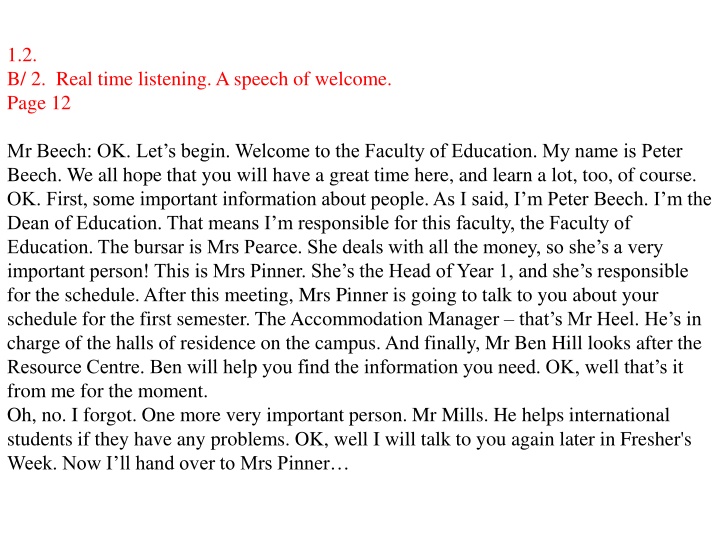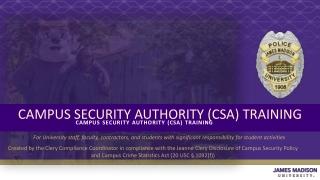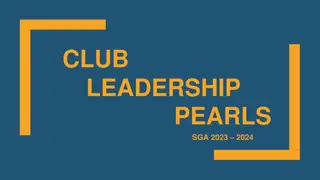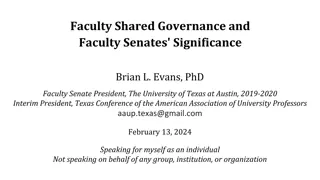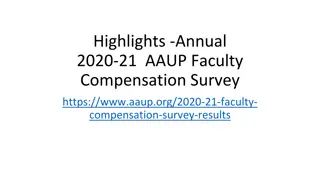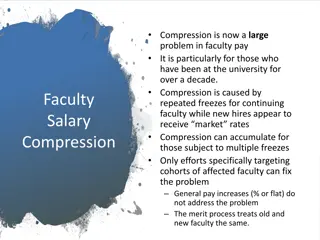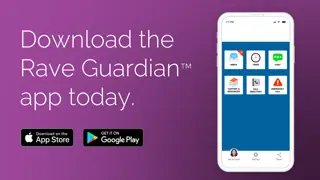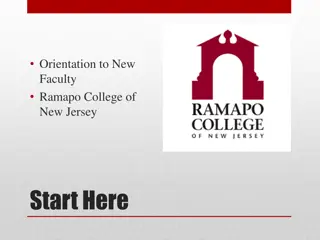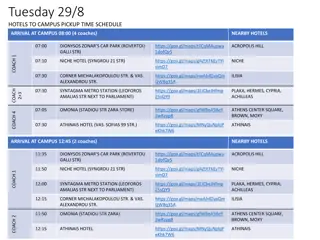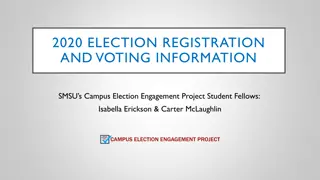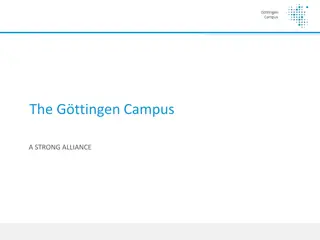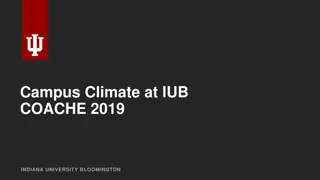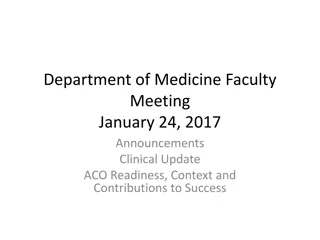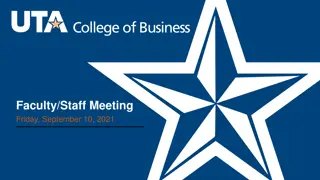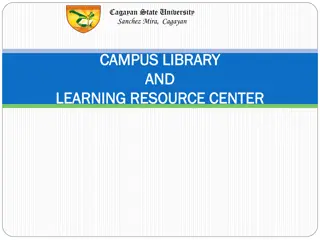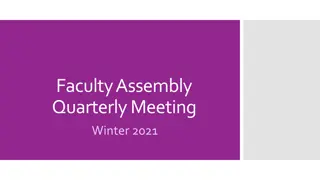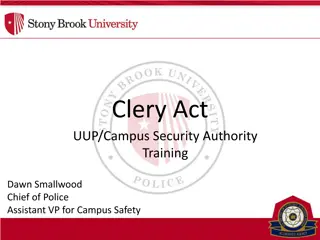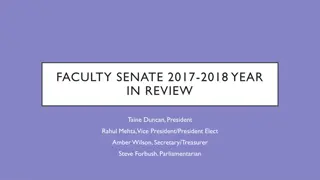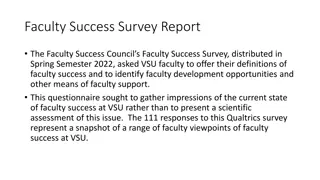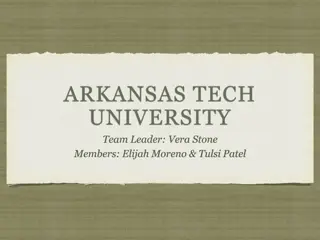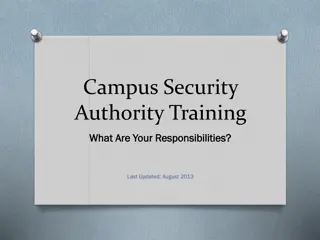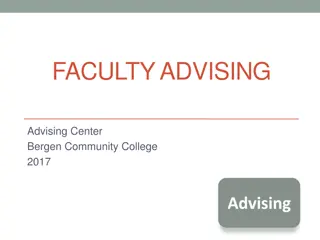Welcome to Faculty of Education - Important People and Campus Information
In this welcoming speech, Mr. Beech introduces key faculty members and campus locations to new students. From the Dean of Education to the Support Services available, this detailed overview provides essential information for a successful academic journey. Mrs. Pinner further discusses campus resources and buildings, including the library, welfare office, and accommodation options. The speech also covers upcoming schedules and assignments, offering a comprehensive introduction to the university life.
Download Presentation

Please find below an Image/Link to download the presentation.
The content on the website is provided AS IS for your information and personal use only. It may not be sold, licensed, or shared on other websites without obtaining consent from the author.If you encounter any issues during the download, it is possible that the publisher has removed the file from their server.
You are allowed to download the files provided on this website for personal or commercial use, subject to the condition that they are used lawfully. All files are the property of their respective owners.
The content on the website is provided AS IS for your information and personal use only. It may not be sold, licensed, or shared on other websites without obtaining consent from the author.
E N D
Presentation Transcript
1.2. B/ 2. Real time listening. A speech of welcome. Page 12 Mr Beech: OK. Let s begin. Welcome to the Faculty of Education. My name is Peter Beech. We all hope that you will have a great time here, and learn a lot, too, of course. OK. First, some important information about people. As I said, I m Peter Beech. I m the Dean of Education. That means I m responsible for this faculty, the Faculty of Education. The bursar is Mrs Pearce. She deals with all the money, so she s a very important person! This is Mrs Pinner. She s the Head of Year 1, and she s responsible for the schedule. After this meeting, Mrs Pinner is going to talk to you about your schedule for the first semester. The Accommodation Manager that s Mr Heel. He s in charge of the halls of residence on the campus. And finally, Mr Ben Hill looks after the Resource Centre. Ben will help you find the information you need. OK, well that s it from me for the moment. Oh, no. I forgot. One more very important person. Mr Mills. He helps international students if they have any problems. OK, well I will talk to you again later in Fresher's Week. Now I ll hand over to Mrs Pinner
1.2 C p. 12 campus resources things to help with studying fees money for a course Welfare Office place to go if you have problems JCR Junior Common Room SCR Senior Common Room hall of residence accommodation for students on campus Students Union (SU) special place for students the university buildings
1.2 D p. 12 Mrs Pinner: Thank you, Mr Beech. Right. You need some information about the campus the university buildings. Firstly, the library is near the main entrance. Next to the library there is the Resource Centre. Resources are things to help you with studying. Ben will help you find the information you need. You can do Internet research in the Resource Centre. The Administration Block is opposite the library. Go there if you have a problem with fees that means the money for your course. Behind the Admin block is the Welfare Office. Go there if you have any other problems ... You will also find the Medical Centre behind the Admin block. OK. Next to the Admin block is the JCR and the SCR that is the Junior Common Room and the Senior Common Room. The common rooms are for the staff, the lecturers. Then on the north of the campus are the halls of residence in other words, the accommodation for students on campus. We have Hall A, Hall B and Hall C. Finally, there s the Students Union the SU. That s the special place for you. There are lots of facilities for you in the SU. Go and have a look OK. Now, as Mr Beech said, I m going to talk to you about your schedule...
1.3 B p. 14 Assignment a piece of work to do on your own. Deadline the time to give in an assignment. Research reading articles. Journal academic magazines. Tutorial a small discussion.
1.3 C. p. 14 listening for definitions 1. Food court a place with lots of different restaurants. 2. Vending machines which are machines with food and drink. 3. laundrette you can wash your clothes there. 4. cr che It s a place to leave your children for a few hours. 5. gym It s a place to do exercise.
1.3 D. p. 14 identifying consonant sound 1. both 2. campus 3. club 4. explain 5. job 6. pay 7. responsible 8. bursar 9. people 10. personal 11. place 12. problem
1.3 E p. 14. Identifying vowel sounds /I/ /i:/ /I/ /i:/ 1 2 3 4 5 in fee teach mean begin 6 7 8 9 free meet ill it give 10
1.4 A p.15 Grammar for listening: Defining 1. It s a place for tennis and squash and football. (A sport centre) 2. It s a person in charge of a library. (A librarian) 3. It s a place for lectures. (A lecture hall) 4. It s a certificate for a university course. (A degree) 5. It s a restaurant for students. You usually serve yourself. (A cafeteria) 6. It s a place for plays and sometimes music concerts. (A theatre) 7. It s a place for experiments. (A lab) 8. It s work outside the university. You visit a place and do research. (A field trip) 9. It s a machine for showing slides, from PowerPoint, for example. (A projector) 10. It s a person with a degree. (A graduate)
1.4. B) p. 15 Defining with subject-verb-gerund 1. revising: It s going over something again, something you have studied before. 2. contributing: It means taking part in something, like a tutorial. It means giving your ideas or your opinion. 3. parting: It means saying goodbye. 4. graduating: It means getting your degree and leaving university. 5. advising: It is telling someone what to do. 6. disagreeing: It is saying you don t agree.
1.5 Applying new listening skills: C P. 16 Mr Mills: Let s start at the beginning. Greetings I mean, saying hello to someone. When you meet someone for the first time, you can say Pleased to meet you or How do you do? . Some English people just say Hi or Hello . All of these are fine. Secondly, be careful when you address people. You can t use titles I mean Mr, Mrs, Professor with a first name, like Mr John, or Mrs Mary or Professor Michael. You must use the surname with a title Mr Williams, Mrs Pearce, Professor Jones. By the way, you call most lecturers at a British university Mr or Mrs or Miss. We only use Doctor if he or she has a PhD. Oh, and Professor. In Britain, a Professor is usually the head of department or faculty. Do not call all lecturers Professor. Handshakes shaking hands. We do shake hands a lot in Britain but not with colleagues, that is, people we work with or study with. So don t offer to shake hands with the other students every time you meet them. What about eye contact? I mean, looking at people. Perhaps, in your country, it is polite to look down when you are talking to an older person, or a person of the opposite sex. But not in Britain. Look people in the eye your lecturers, the Professor, even the Vice Chancellor. They will not think you are disrespectful. The next thing is social distance in other words, how close you should stand to people. In Britain, we stand about 60 centimetres away from colleagues that s about arm s length. Next, gender equality. Gender means sex male or female. So gender equality is the way we think about men and women in Britain. Basically, men and women are equal. You may have male lecturers, or female lecturers or a combination, but they are all equal same pay, same level in the university. Finally, participation, which means taking part in something. Lecturers sometimes ask questions during a lecture and they expect you to answer. They sometimes ask for questions at the end of a lecture. It is good to ask questions if you are not sure about something. And of course, lecturers expect active participation in a tutorial.
custom notes greetings Pleased to meet you. How do you do? Hi! / Hello! not with colleagues don t shake hands with other students every time look people in the eye even lecturers 60 cm, about arm s length handshakes eye contact Social distance Gender equality male and female equal equal pay ask questions at the end of lectures take part in tutorials participation
1.5 D) Transferring information P. 16 custom greetings notes It means / is saying hello to someone. It is a way of greeting someone. It means / is looking at someone when you speak to them. handshakes eye contact Social distance It means / is how close you stand to someone. Gender equality It means that men and women are equal. participation It means taking part in something.
1.7. Real Time Speaking. Education in the UK. B Page. 18 Type of School nursery Age Range 3 5 Exam at the End none most = none; primary 5 11 a few = 11+ GCSEs A levels secondary sixth form 11 16 16 18
1.8 Learning new speaking skills: Giving general and personal information Identifying a new skill (1) Page. 20 G 2 Children learn a lot about themselves in Drama. Drama is a very important subject. I took Drama for GCSE. I got a good pass in the examination. I was the main person in one of the plays. G P P P P 1 1 5 3 4 I wasn t very good, but I had a lot of fun. G 3 Most secondary schools in Britain have Drama classes. G 4 Some children take examinations in Drama at GCSE or A level. P 2 We did a lot of drama games, and we put on a play every term.
1.10 Applying new speaking skills: What is a good teacher? C . Page. 22 Researching information Good Bad keep order (= stop bad behaviour) explain clearly Sarcastic (= make fun of) belittle children (= make feel small) show enthusiasm (= like subject, unfair (= reward wrong children) excited about teaching) treat children as individuals (know give punishments (= bad things, wrong children) names, personal facts) sense of humour (make jokes) other ideas eye contact patient mark work and return it quickly other ideas angry, shout don t return work don t explain
1.11 A. Developing vocabulary page 23 a type of website, e.g., .ac = an academic website, probably a University a program which finds websites and webpages the way computers in different locations are linked together to share information 1. domain 2. Search engine 3. The Internet 4. webpage one page on a website a set of webpages on the world wide web an entrance on the Internet to a set of resources a program which damages computer documents or programs a connection between two Internet documents a way of protecting your computer or documents on your computer 5. website 6. portal 7. Virus 8. link 9. password
1.11. B. Developing independent learning page. 23 1- topic. 2- secondary. 3- primary. 4- experiment. 5- recording. 6- data.
1.12 C. Understanding vocabulary in context page. 24 1. sensibly (adv) in a correct or practical way; He does not always behave ~. (adj) after lectures; There are many ~ activities at this university. (v) show someone you have a good opinion of them; You should ~ people who are older than you. (adv) with no waste of time; If you do this job ~, it will only take a short time. (n) personal idea or view; In my ~, the library is better than the Internet for most research. (n) allowing someone to do something; Have you got ~ to be here? (v) make someone remember something; The lecturer ~ed me to give in the assignment tomorrow. (v) organize or control; They ~ their money very well. 2. extracurricular 3. respect 4. efficiently 5. opinion 6. permission 7. remind 8. manage
1.13 A. Reviewing vocabulary page. 26 Manage eat respect do miss Spend Think listen participate Write manage your life. Eat healthily respect fellow students do research miss deadlines spend time studying Think critically listen to lectures participate in tutorials write essays.
1.13 B. Identifying a new skill (1) page. 26 What should you do before you read a text? (read the title or heading) Why is this a good idea? (it helps you predict the text) Why should you read the introduction or first paragraph? (you can check your predictions)
1.13 C. Identifying a new skill (2) page. 26 Staff at Greenhill University We are delighted to welcome you to the university. We would like to introduce you to some of the staff so you know who to go to if you have any problems. ------------------------------------------------------ University Sports Club Do you want to get fit, or just have some fun with friends? Come and join the university s own sports club in the Sports Centre near the main entrance. ------------------------------------------------------ Using the projector It is easy to use the projector in each tutorial room if you follow these simple instructions. -------------------------------------------------------------- IT Services and Support We re here to make sure you stay connected everywhere on the campus. -------------------------------------------------------------- IMPORTANT NOTICE Portable Electrical Equipment. In accordance with the Electricity at Work regulations 1990, we must test all electrical equipment for safety. --------------------------------------------------------------
Using your own PC / laptop All rooms in the halls of residence have Internet connections free of charge. Note: This is not wireless. You must buy a cable from the IT Support Office. --------------------------------------------- Inspection day Please leave all electrical equipment on your desk on the day of the inspection. Each items costs 1.10. The inspector will put a sticker on each safe item. --------------------------------------------- Mr Mills is in charge of ISS, the International Student Support service. Go to Mr Mills if you want extra help with your English, for example. --------------------------------------------- Opening hours 7.00 a.m. 10.00 p.m. Monday to Friday 9.00 a.m. 6.00 p.m. Saturday and Sunday ---------------------------------------------- Switch on the device. (The Power On switch is on the underside.) Switch on your laptop. Go to PowerPoint on your laptop.
1.14 A. Grammar for reading: Imperatives; time phrases with present and past Page. 27 Be careful with your credit card details. Don t click on links in e-mails from strangers. Don t open e-mail attachments if you don t know the sender. Install a good antivirus program. Never give your name and address in a chat room. Protect your data with a password. Turn off wireless and Bluetooth in public Don t believe everything you read.
1.14 B. Predicting time with time phrases Page. 27 present past present past At one time, In the 20th century, At that time, Last week, At the moment, Now, At the present time, Nowadays, Currently, Then, In her childhood, Yesterday,
1.15 C.1. Understanding advice Page. 28 X a. Do a lot of research. b. Always do research in a library. Go to the library if possible. c. Never use the Internet. X Use the Internet if you can t find good books for your research. X X X d. Don t read sites with .co.uk or .com. e. Don t read private sites. f. Don t read sites with .org or .gov. g. Always start with Wikipedia. h. Report information in your own words. i. Cut and paste interesting parts of websites. These are good sites after .ac or .edu. Never use this site. Always take notes.
1.15 C.2. Understanding advice Page. 28 a. Because you will get good marks. b. Because the information is organized, books are checked and the librarian can help. c. Because when the library is closed or the book you want is out. Then you must use the internet. d. Because they are commercial, trying to sell you something. e. Because nobody has checked these sites. f. Because these are not commercial sites. g. Because it is not an academic site. h. Because you must avoid plagiarism. i. Because you must avoid plagiarism.
1.15 D. Present or past? Page. 28 Plagiarism is copying someone s work. The word comes from Latin. It means to steal or kidnap . At one time, students stole paragraphs from webpages. Lecturers accepted their work. But in 2001, a lecturer at an American university checked student assignments. He had a new computer program. He found 158 cases of plagiarism. Forty-eight students had to leave the university. Nowadays, all university lecturers use computer programs. They find plagiarism easily. Don t cut and paste from websites. Sometimes, the lecturer gives no marks for an assignment with plagiarism. Sometimes, the university asks the student to leave.
1.15 D. Present or past? Page. 28 GF Plagiarism is copying someone s work. The word comes from Latin. It means to steal or kidnap . At one time, students stole paragraphs from webpages. Lecturers accepted their work. But in 2001, a lecturer at an American university checked student assignments. He had a new computer program. He found 158 cases of plagiarism. Forty-eight students had to leave the university. Nowadays, all university lecturers use computer programs. They find plagiarism easily. Don t cut and paste from websites. Sometimes, the lecturer gives no marks for an assignment with plagiarism. Sometimes, the university asks the student to leave. PAST PRES ADV GF
Page. 30 Knowledge quiz: Education parts of a campus 1.2 Real-time listening customs 1.5 Applying new listening skills pictures 1.4 Grammar for listening types of school in the UK 1.7 Real-time speaking good teacher / bad teacher 1.10 Applying new speaking skills advice to new student 1.12 and 1.15 reading texts: Life at university and Research at university
1.16 Vocabulary for writing. Getting into a university A. Activating ideas Page. 31 Get certain qualifications (school-leaving certificate at a particular level). Complete a form (when?). Complete a form and send it in by a certain date (students may need to send photos and references, copies of certificates, etc., with the form). Go for an interview.
1.16 B. Understanding new vocabulary Page. 31 1. apply. 2. application . 3. details. 4. qualifications. 5.level. 6. complete. 7. applying. 8. experience. 9. hobbies. 10. referee.
1.16 C. Developing independent learning Page. 31 1. apply is the root. 2. deletion, organization, qualify, editor, hobbies.
1.17 A. Understanding a discourse structure (1) Page. 32 used more than one letter for each space not used black ink written in the last column put crosses in boxes (not ticks) and used more than one box not written date in correct format
1.17 C. Understanding a discourse structure (2) Page. 32 Personal Statement My name is Olivia Amanda Martins and I am eighteen years old. I am British. I was born in London on 15th April 1992. I am single. I live in Lymington on the south coast of England. I am applying for the BA course in Education. I want to study Education because I enjoy learning about this subject very much. I am particularly interested in primary education. I hope to become a primary teacher. I attended Pennington Primary School from September 1998 to July 2004. I went to Lymington Secondary School from September 2004 to July 2009. Then I enrolled at sixth form college. I am studying at Brockenhurst Sixth Form College now. I started in September 2009. I am taking English, Psychology and Drama in the sixth form. At the end of secondary school, I obtained ten GCSEs in a wide range of subjects, including Maths, Biology and French. Next year, I hope to get a B in English and Psychology and a C in Drama. I am trained in first aid, and I also have a life- saving certificate. At secondary school, I was the captain of the girls football team. Out of school, I go to Guides. I also participate in a local youth theatre. At the moment, I am working part-time for a local publishing company. I am doing research for a series of books for primary children. In conclusion, I am a hardworking student. I get on well with people of all kinds. I believe that primary teaching is the career for me because I like working with young children.
1.17 D. Producing key patterns Page. 32 1. Full name 2. Place and date of birth 3. Names of schools and dates 4. Place of study 5. Subjects and/or exams 6. Hobbies, part time jobs, etc.
1.18 Learning new writing skills. Paragraphs from a Personal Statement A. Developing vocabulary page 34 1. a. increase f. study b. eighteen g. teach c. faculty h. mean d. read i. leave e. details j. degree
1.18 Learning new writing skills. Paragraphs from a Personal Statement B. Identifying a new skills page 34 I also participate in a small music group. 6 2 1 4 2 7 6 8 3 1 5 3 2 5 1 8 I am applying for the BA course in Engineering. I am married. I am not studying at school now. I am particularly interested in machines. I am working full-time as a sales assistant at the moment. I enjoy playing the guitar and writing music. I believe that engineering is the career for me because I like working with machines. I finished school in July 2009. I live in Madrid. I obtained the International Baccalaureate (IB) in 2009. I studied at the American School of Madrid. I want to become an engineer. I scored 38 points in the IB. My name is Pablo Juarez and I am Spanish. In conclusion, I always try hard in my studies.
1.19 Grammar for writing: Present simple; present continuous Page. 35 A. 1. Nationality, age, marital status (married, single, divorced, etc.), home town, place, hobby
1.19 Grammar for writing: Present simple; present continuous Page. 35 A. 2. verb live participate get on with play have go extra information place / town activities / sports people sports, games qualifications place / town
1.19 Grammar for writing: Present simple; present continuous Page. 35 B.1. a. I like studying science. b. I love teaching young children new things. c. I enjoy learning mathematics. d. I want to do a course in medicine. e. I hope to become a doctor.
1.19 Grammar for writing: B.2 Present continues = I m in the middle of doing something. It means that an action has started but not finished yet. * Subject + am, is, are + verb (ing) eg. I am studying. * Negation Subject + am, is, are (not)+ verb (ing) * Interrogative Verb be + subject + verb (ing)
1.20 Applying new writing skills: A Personal Statement A. Reviewing vocabulary. Page 36 1. apply to a university 2. attend a school / university 3. complete a form 4. enrol at a college 5. have a certificate 6. lead a group / club 7. obtain certificates 8. play a sport / musical instrument 9. study a subject 10. take exams
1.20 Applying new writing skills: B. Key writing stages Page 36 The TOWER of writing. T = Think O = Organize. W = Write E= Edit R= Rewrite.
Portfolio: Activities and clubs Page 37 A. Activating ideas. chess Public speaking /debates judo / martial arts computing / information technology astronomy aerobics / keep fit tennis Graphic design
Portfolio: Activities and clubs Page 37 group (1). 1.24 IT stands for information technology so the IT Club is for anyone interested in computers. Do you like playing games on your computer? Do you use Word or Excel? Do you send e-mails? Would you like to learn how computers work? Then this club is for you. We meet at 12.30 p.m. on Wednesdays, in the IT Room of course, which is next to Room 16 on the ground floor. The meetings last for one hour so we finish at 1.30 p.m. There is something for everyone. You don t need to bring your laptop. There are 20 computers in the IT room. What do we do in the meetings? Well, you can learn the latest computer game, get help with computer applications, like Word and Excel, or you can even learn to program in C++.
Portfolio: Activities and clubs Page 37 group (2). 1.25 We are looking for new members for the Debating Society. What is the Debating Society? Well, a debate that s D-E-B-A-T-E is like a conversation between two people. But in a debate, one person likes something, and the other person doesn t like it. There are two speeches one from each person. Then the audience, that s the other members of the Debating Society, the audience chooses between the two people. So who is the Debating Society for? Well, two kinds of people. Firstly, people who like to speak in public, in front of a group of people. Secondly, for people who like to listen to ideas and opinions. We meet straight after school in the school hall on Thursdays for an hour so that s from 4.00 p.m. To 5.00 p.m. Each week, there is a debate. You can lead a debate or just sit in the audience and choose the best speaker at the end.
Portfolio: Activities and clubs Page 37 B. Gathering information (1). Group 1. 1.24 Group (1). IT Group (2). Debating for? anyone interested in computers IT Room next to Room 16 school hall Wed 12.30 finish time? 1.30 do? learn computer games; get help with Word / Excel; learn to program 1. people who like to speak in public; 2. people who like to listen to ideas where? day? start time? Thu 4.00 5.00 lead a debate; sit in the audience + choose the best speaker
Portfolio: Activities and clubs Page 37 C. Gathering information (2). Drama Volleyball Geography for? People who like acting Good players or beginners anyone where? Drama Studio day? Tues start time? finish time? do? Work towards putting on plays Netball courts Room 24 Fri Mon 3.45 12.30 4.30 Around 6.00 1.30 5.30 Good players with team; Beginners learn game, have fun help with assignments; games; projects
2.1. B. Understanding vocabulary in context Page. 43 A person is an individual. Psychology is about individuals. Psychologists ask questions like: What is the mind? How does it control human behaviour? People have relationships with other people. Sociology is about human behaviour in groups. Sociologists ask questions like: Why do people form groups? Why do groups sometimes behave badly? In the diagram, the circle for my family is separate from the other three circles. Why? Because my family is different from my friends, my neighbours and my colleagues. Why are these three circles linked? Because some of my friends live in my neighbourhood and some of my friends are also my colleagues. Sociologists call the four inner circles the primary groups. The people in your primary groups are very important to you.
